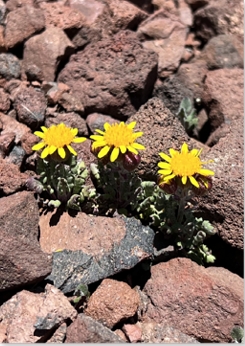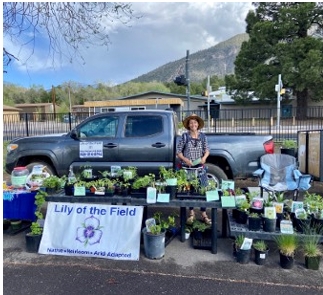August Chapter Meeting
Posted on Jun 05, 2025
In-person meeting only. Date and location TBD

The Flagstaff Chapter will offer in-person meetings this year with the option to watch from home via Zoom. The meetings will still take place on the third Tuesday of the month, March through October, at 7:00 PM. We have a new location for 2025! The meetings are now being held at the Northern Arizona University Biology Sciences Building, Room 328. Street parking is available nearby. The doors will be locked in the evening, so please meet at the southern
door (the end with the NAU herbarium) to be let in.
Some of the meetings have been recorded and can be viewed the Flagstaff Chapter’s Facebook or at The Arizona Native Plant Society. For details about
upcoming meetings, please see our email distribution list (naris123@cs.com), Facebook page, or AZNPS.com.
Register in advance once in order to attend any of the meetings virtually: https://us02web.zoom.us/meeting/register/fCOe0-qlSZmMeGZNsNfV_A
After registering, you will receive a confirmation email containing information about joining the meeting.
Use the link Zoom sends or the passcode 242464 to join the meeting.
Field Trips
Field trips generally leave from south end of the Walmart parking lot on Woodlands Boulevard on Saturday following the talk, April-October. Carpooling is usually available. Please watch for specific details.
JOIN OUR CHAPTER E-LIST
Join Our Chapter E-list: If you would like to receive reminders and announcements about field trips and meetings via e-mail, send a note to Sue Holiday to be added to the list. Stay informed by joining us on Facebook.
Usually the most up-do-date information about upcoming chapter events can be found on our Facebook page.
* Photos above by Sue Carnahan.
| Name | Role | Contact |
| Kirstin Phillips | President | flagstaffAZNPS@gmail.com |
| Melissa Amberson | Chapter Contact | azmelissa@yahoo.com |
| Sue Holiday | Email Distribution | naris123@cs.com |
| Barbara Phillips | Hike Information | bagphillips@yahoo.com |
Want to get involved? We've got just the thing!
Posted on Jun 05, 2025
In-person meeting only. Date and location TBD

Posted on Mar 04, 2025
Tuesday, March 18, 7:00 PM: Catherine Young. Analysis of Potential Hazards to
the Future Conservation of the Endemic Alpine Species Packera franciscana

Catherine Young, a junior at the NAU School of Forestry, will present the important conservation breakthroughs that she has made for the threatened alpine sunflower, Packera franciscana. The species is only found near Flagstaff, above the treeline of the San Francisco Peaks. She successfully established
the first captive population of these plants outside of a greenhouse setting. Her observations in the field suggest that a new hybrid zone has formed within the last 10 years. She has also created the first tissue culture protocol to produce genetically identical plants to those in the wild. The most recent developments are laying the foundation for her future project that will attempt to predict the response of the species to potential hazards such as climate change, competition with hybrids, and wildfire.
Hybrid meeting: in-person and via Zoom.
Posted on Mar 04, 2025
Tuesday, April 15, 7:00 PM: Amelia Blake. Propagating Native Plants
Growing uncultivated plant varieties can be challenging. They often have seed dormancy, unique soil needs, and don’t grow well in containers. Because of this, many native plants are not available in
the nursery trade and native plant enthusiasts are left to cultivate their own. Amelia will discuss strategies for successful native-plant propagation.
Amelia is co-owner of Lily of the Filed Nursery, which focuses on growing native and heirloom plants that are especially well-adapted to the Flagstaff area. Amelia spent her childhood working with plants at the NAU Research Greenhouse during her father’s tenure as greenhouse manager. She received her B.S. in Plant Sciences from the University of Arizona. She then worked at Native Plant and Seed for three years before opening Lily of the Field Nursery in 2020 with her husband. She sells at most local markets, runs the Gardeners’ Market in east Flagstaff each spring, and sells by appointment from her home in the Upper Greenlaw neighborhood. Hybrid meeting: in-person and via Zoom.

See what your chapter has been up to!